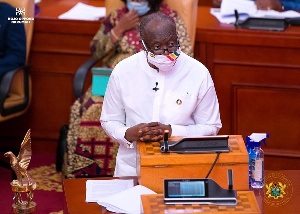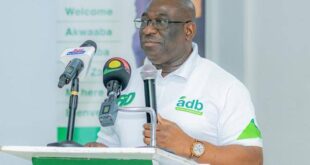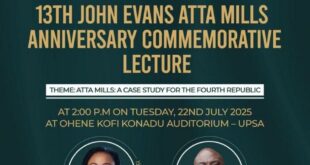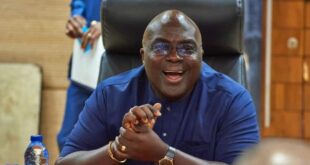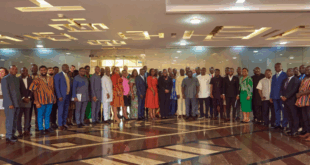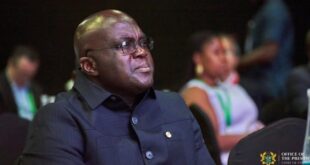2021 EXPENDITURE IN ADVANCE OF APPROPRIATION
WEDNESDAY, 28TH OCTOBER, 2020
SUBMITTED BY KEN OFORI-ATTA MINISTER FOR FINANCE
ON THE AUTHORITY OF HIS EXCELLENCY NANA ADDO DANKWA AKUFO-ADDO, PRESIDENT OF THE REPUBLIC OF GHANA
1. Right Honourable Speaker, in accordance with Article 180 of the 1992 Constitution, and in line with Standing Order 145 ofthis Honourable House, on the authority of His Excellency the President, Nana Addo Dankwa Akufo-Addo, I beg to move that this Honourable House approves by resolution the withdrawal of the sum of Twenty-Seven Billion, Four Hundred and ThirtyFour Million, One Hundred and Eighty Thousand, Five Hundred and Twenty Ghana Cedis (GH¢27,434,180,520) from the Consolidated Fund for the purpose of meeting expenditurenecessary to carry on the services of Government in respect ofthe period expiring three months of the Financial Year or on the coming into operation of the Appropriation Act in respect of 2021 Financial Year.
2. Mr. Speaker, this is also in line with Section 23 of the Public Financial Management Act (PFM), 2016 (Act 921). I humbly request the Hansard Department to capture the full document.
3. Mr. Speaker, permit me to extend the gratitude of His Excellency the President for the support and cooperation received from this august House during his first term of office. Together with the abundant and abiding grace of God, this Session of Parliament has been most vital in transforming the economy and providing for a better future for our “fellow Ghanaians”.
Mr. Speaker, in 2017, when I had the privilege and blessing to stand before you, I invoked “The miracle of the five (5) loaves and two (2) fishes” to illustrate the predicament we found ourselves. In using that miracle , I was declaring our faith and hope in a God who can do much with little and in fact do exceedingly above all we can ask or think and submitting that we need not fear because the battle is the Lord’s.
Mr. Speaker, as it is evident to all not only have we turned the economy around through hard work and innovative policies, but we also have the courage to implement a GH¢100 billion GhanaCARES (Obaatanpa) programme.. The diligent and disciplined pursuit of the innovative policies have restored macroeconomic stability, promoted inclusive growth and transformed lives of millions of Ghanaians. Today, Mr. Speaker, some 1.2 million Ghanaians are in Senior High School, almost 3 million of our children are in the school feeding programme. We are exporting food through the Planting for food and jobs programme and 1D1F is generating jobs all around. How far indeed has the Lord brought us. This is the competence we promised Ghanaians.
Mr. Speaker, it is trite knowledge that data speak for itself. Permit me to use the data to separate facts from opinions, even if these opinions emanate from persons, or may I say fathers, who should know better. The success of our focused
macroeconomic stabilization and fiscal consolidation programme is evidenced by:
i. growing the economy, at an average rate of 7.0%
between 2017 and 2019 as compared with 2.8%
between 2014 and 2016;
ii. reducing inflation from 15.4 percent at end-December
2016 to 7.9 percent by the end-December 2019; the
lowest since the 4th Republic in 1992;
iii. maintaining an average fiscal balance below a 5% of GDP
threshold between 2017 and 2019 as compared to an
average of 6.3% in 2014 and 2016;
iv. improving gross international reserves to reach US$8.6
billion or about 4 months of import cover by February,
2020 as compared to 3.5 months of import cover in 2016;
v. successfully exiting the IMF-ECF programme in April 2019
which had been completely derailed by 2016.
Mr. Speaker, leadership of any nation succeeds or fails on the strength or weakness of how the economy is managed. A leader who cannot run the economy is a leader who can never be trusted to deliver. Leadership is about the economy and the character of the leader. It is about knowing how to grasp the problems, the expertise to find solutions, the courage to take bold decisions, the conviction to stay the course, the competence to get it fixed, the compassion to cushion the impact on the people, and the vision to create new and transforming opportunities for the people out of the situation. I recall how in 2014, ‘according to a Bloomberg annual table’, the cedi was the worst-performing currency in the entire world, only managing to perform better than war-torn Ukraine’s Hryvnia.
Indeed, in dollar terms, the former President took an economy that was 64 billion dollars in 2013 and shrunk it down to 55 billion dollars in 2016. This means that after 4 years in office, the Mahama administration managed to achieve an unenviable record of reducing the Ghanaian Economy by nearly 10 Billion USD. These, Mr. Speaker, are the facts.
Mr. Speaker, in 2001, Ghana had no choice but to swallow her pride and to sign up to the HIPC initiative, a legacy left by the outgoing NDC government. Thankfully, President J.A. Kufuor got us to completion point in record time and came out of
HIPC. By 2014, barely 2 years in office, President Mahama’s ‘homegrown’ economic policy had failed and Ghana signed up once again onto an IMF programme. The Akufo-Addo Govt took Ghana out of the IMF Programme in record time.
Ironically, those who mismanage the economy for us to come and fix it are the one’s wishing Ghana ill. My message to them is this; there is no turning back. HIPC is behind us. Economic mismanagement is behind us. The economy is stronger today than it was 4 years ago, and will continue to grow stronger and stronger with 4 more years to do more for the people of Ghana, with God’s help.
Mr. Speaker we must be careful as a nation to reject those who return from the Promised Land, with a bad report to subvert the spirit of our people and to reject leaders who would take us back to Egypt.
Mr. Speaker, in our quest to stabilize the economy, we have also lowered the rate of debt accumulation, re-profiled our debt, and, implemented a number of structural reforms in a transparent manner for an efficient and effective management of public debt.
Mr. Speaker, these significant macro-fiscal gains were achieved in spite of having:
i. paid GH¢12 billion in excess energy capacity charges which we inherited in 2017, and have kept the lights on;
ii. settled substantial part of the GH¢11 billion outstanding arrears bequeathed to us;
iii. abolished 17 unproductive taxes to boost productivity of the private sector;
iv. spent GH¢ 21.6 billion to clean-up a collapsing financial sector and protected 4.6 million depositors and 81,700 investors.
That is the competent governance, hard work and God’s hand that has delivered us.
Mr. Speaker, for fair-minded observers, the above economic indicators are clear evidence of the sharp and stark difference between a competent Akufo-Addo-led Government and others.
Mr. Speaker, these gains have not been at the expense of our promise to improve the welfare of fellow Ghanaians. In fact, the issue of welfare is very dear to President Akufo-Addo and his government. For this reason, we invested in excess of GH¢15.7 billion on key flagship programmes.
Mr. Speaker, these flagship programmes have created the platform for real economic transformation; strengthening human capital through enhancing access to health care, education and skills development, modernizing agriculture and industry, delivering infrastructure across the country – including a revitalised railway sub-sector – and creating jobs. We have remained faithful with our budgets; Asempa in 2017, Edwuma in 2018, Mpuntuo in 2019 and the prescient Nkosuo
and Nkabom budget of Covid 19 2020.
Mr. Speaker, we have restored Nurses and Teachers Training Allowances and implemented the Free SHS programme to empower current and future generations, and to also ease the financial burden on households. In addition to supporting
100,000 graduates through NABCO, we have lowered the net tax burden of the Ghanaian. That is the care we promised Ghanaians!
Mr. Speaker, achievements from the prudent macro-fiscal policies and the resultant turnaround of the economy, amidst unprecedented welfare-oriented interventions under the flagship programmes have been fully tested by the outbreak of the COVID-19 Pandemic since March, 2020.
Mr. Speaker, this pandemic continues to devastate countries, disrupt productivity, threaten food security, multiply job losses, and reduce incomes, particularly for the poorest, as well as traumatic loss of lives. This year, the world is on course to experiencing the deepest global economic contraction in the
post-war era, causing investments and trade to plunge.
Mr. Speaker, the Ghanaian economy has also faced the health and economic consequences of this pandemic which threatens lives and livelihoods. By God’s Grace, COVID-19 has so far not been as deadly due to our President’s leadership, thus , our preoccupation has been on addressing the socio-economic dislocations occasioned by this pandemic. We have moved swiftly to mitigate the threats to lives and livelihoods by:
i. Implementing the GH¢1,342million Covid-19 Emergency Preparedness and Response Plan to protect lives;
ii. Operationalising the GH¢1.2 Billion Coronavirus Alleviation Programme (CAP) to support businesses;
iii. Launching a GH¢2 billion Guarantee Scheme to enable SMEs borrow at a more affordable rate;
iv. Supporting the GH¢3 billion credit and stimulus package by commercial banks in Ghana to revitalize industries, especially pharmaceutical, hospitality, services and manufacturing sectors;
v. Offered strategic support in income increases and life insurance in excess of GH¢ 320 million to incentivize health workers and allied professionals;
vi. Supporting households and businesses with electricity and water subsidies in excess of GH¢1.3 billion; and
vii. Funding the provision of cooked food to 1.83 million and 917,000 vulnerable persons within Accra & Kumasi metropolis, respectively. This is the compassion Ghanaians deserve, which we promised.
Mr. Speaker, Leadership is best tested in times of crisis.Whether it is to do with the crisis of Dumsor, the crisis of homegrown economic mismanagement or the imported crisis of a global pandemic like the novel corona virus; it is when crises hit, that the people see and feel who a real leader is and who is not.
Earlier in March, President Akufo-Addo told the nation ‘we know how to bring the economy to back to life. What we do not know is how to bring people back to life. We will therefore protect people’s lives, then their livelihoods’. Mr. Speaker, those words were truly profound and true to his character, the president has put his leadership skills just where his mouth is. Government set out to protect people’s lives, and then their livelihoods as well. The whole world and more importantly, the vast majority of Ghanaians know that the President and his team have managed the Covid 19 crisis far better than most countries in the world. Indeed our efforts have been adjudged as among the best three in the world.
Mr. Speaker, the robustness of our macro-economic fundamentals and the efficacy of Government’s COVIDmitigation measures have been borne out by recent indicators.
According to the Bank of Ghana’s surveys in August 2020,consumer confidence is bouncing back strongly and is currently above pre-COVID-19 lockdown levels. Business confidence has also increased, although below pre-lockdown levels. About 95 percent of businesses surveyed showed strong optimism, reflecting the improving macroeconomic conditions, stability in the exchange rate, lower input prices, moderation in lending rates, and positive industry prospects.
Accordingly, the projected GDP growth rate 2020 reported in July has been revised from 0.9 percent to 1.9 percent to reflect these dynamics. As the Bank of Ghana stated ‘the green shoots of rebound in economic activity’ are already with us. We must be thankful to God for these encouraging developments. This and other assessments provoke a degree of optimism and reveals that the swift, bold, and effective measures implemented by Government have been key in quickening the pace of economic recovery. This is the competent leadership we promised under President Akufo-Addo. Indeed, the President’s decisive and compassionate leadership in these challenging times have been internationally acknowledged and
has added to our reputation as the Black Star of Africa.
Mr. Speaker, our efforts to protect lives and preserve livelihoods, coupled with the impact of the pandemic on revenues and expenditures resulted in a fiscal deficit of 11.4% of GDP. As already indicated in the presentation to this august House in July, we have a well-thought-out Ghana Cares Obaatanpa plan and strategy to return this economy to a more sustainable fiscal path in the medium-term.
Mr. Speaker the 2020 Fiscal Framework which increased the fiscal deficit from 4.7 percent of GDP to 11.4 percent in the 2020 Mid-Year Review.
The fiscal operations of the economy for the January to September, 2020 period show that, on provisional basis both revenues and expenditures exceeded
their respective targets resulting in the fiscal deficit of 9.0 percent of GDP, against a programmed deficit of 8.9 percent of GDP. More specifically, total revenues and grants for the period which totalled GH¢36.7billion exceeded the target of GH¢35.7 billion by GH¢972.7million or 2.7 percent. Total expenditures, including arrears clearance, on the other hand, amounted to GH¢71.3 billion against a target of GH¢70.0 billion showing a deviation of GH¢1.3 billion or 1.8% from target. The overall fiscal deficit resulting from the revenues and expenditure performance for the period through September 2020 is GH¢34.6 billion or 9.0 percent of GDP against a target GH¢34.3 billion or 8.9 percent of GDP. The corresponding primary balance was a deficit of GH¢15.7 billion or 4.1 percent of GDP against the target of GH¢15.4 billion or 4.0 percent of GDP.
Mr. Speaker, this means that we can now approach the next financial year with increased optimism, largely because we already have a plan, and may I say, a track-record. We expect growth to rebound strongly in 2021 at 5.7 percent as a result of our implementation of the Transformation and Revitalization phase of the Ghana CARES (Obaatanpa) Programme. In addition, we have also scaled down the projected 2021 Fiscal Deficit from 9.6 percent of GDP as reported in the Mid-Year
Review to 8.3 percent of GDP, reflecting the improved revenues from the anticipated pick-up of economic activities and a more rationalised public expenditure programme. With this path, we expect a return to the fiscal responsibility threshold of 5.0 percent of GDP fiscal deficit and a positive
primary balance earlier than the 2024 fiscal year previously
announced.
Mr. Speaker, I want to assure this House that we will recover, we will revitalize, and we will transform the economy. We shall pivot off the AFCFTA headquarters in Accra for Ghana to become a dynamic regional hub. We have planted the seeds for a fast-paced and more inclusive recovery. Recognizing the
role of capital and credit, we are certain that the cleaned-up and revitalized financial sector will support our recovery efforts and sustain growth.
Mr. Speaker, let me give you a glimpse of our new strengthened financial ecosystem which will facilitate credit and investment to the private sector. We have established the Ghana Incentive-based Risk Sharing System for Agricultural Lending (GIRSAL) to facilitate lending to the Agricultural sector, the Ghana Amalgamated Trust (GAT) to support indigenous participation in the banking sector, Ghana Commodity Exchange (GCX) to modernize Agricultural transactions and provide security for our farmers, the Ghana Deposit Scheme (GDS) to protect depositors funds, the National Housing and Mortgage Finance Scheme (NHMFS) to provide mortages to our working class and middle class citizens, the 2 billion cedi Credit Guarantee Scheme (CGS) to support large businesses, and the CAPBUSS scheme run by NBSSI to support MSME’s amongst others, in order to sustain and complement these reforms. Mr. Speaker, we have also established a National Development Bank which already has commitments of over 500 million USD as a wholesale bank to further support these financial institutions.
Mr. Speaker, in 2021, we will see significant investment in infrastructure, especially affordable housing. These interventions will create more jobs and enhance artisanal skills.
A few days ago, my colleague Hon. Atta Akyea and I joined HE President Akufo-Addo to commission 204 new houses at Tema Community 22. These houses were largely constructed and supervised by local contractors and consultants under the
National Mortgage and Housing Fund Scheme (NMHFS). This project was completed in nine-months, amidst COVID-19 pandemic, and created over 1,500 jobs. We will replicate this housing model across the country and alongside the agenda
111 district hospitals programme.
Mr. Speaker, we expect that our digitalisation programme in the public sector will improve efficiency and enhance the delivery of service. Government introduced the Digital Addressing System and the National ID programmes to ensure that all Ghanaians and their dwellings, as well as business locations, are uniquely identified. All these efforts have been made to formalise the economy and improve its global competitiveness.
Mr. Speaker, we took the necessary and bold steps to stabilise the economy, ensure food security, protect businesses and worker incomes, strengthen the health system, attract private investments, and support Ghanaian businesses. We will preserve the gains as we continue to protect lives and livelihoods from the COVID-19 pandemic. The collective successes we have achieved so far demonstrate our dedication and commitment towards a transformed Ghana and its people,
beyond aid.
Mr. Speaker, as I indicated earlier, in March 2017, I stood here and asked that this august House support this administration turn around the economy with the paucity of resources that we inherited as in the story of the five loaves and two fishes.
Mr. Speaker, I am in awe of what God has done in the last four years. Not only have we accomplished the miraculous economic turnaround, we have also gathered our 12 baskets leftovers to begin the implementation of our GH¢100 billion
GhanaCARES (Obaatanpa) programme. Let me assure you Mr. Speaker, that he who begun a good work with us will carry it on to completion. Ghana is at a breakthrough moment-our BAAL PERAZIN is upon us. But Mr. Speaker, we must as a nation be prepared to work hard to burden share and to sacrifice for the national good, and to desist from difficult negotiations at such times of a global pandemic. I am confident that the Lord will repay us for the years the locust has eaten and pour out his spirit on all of us.
Mr. Speaker, I want to reassure the House that, despite the setbacks from the pandemic, we are on-track to recover. We have made adequate budgetary provision to ensure that the elections are conducted in a safe and secure environment.
Government has also instituted various security measures to ensure that we have peaceful elections and effectively contain all threats.
Mr. Speaker, for the purposes of the 2021 Expenditure in Advance of Appropriation, we have projected the 2021 first quarter Total Revenue and Grants at GH¢13.3 billion while total expenditure including the clearance of arrears is projected at GH¢24.0 billion. This results in the projected fiscal deficit
of GH¢10.7 billion for the period.
Mr. Speaker, to support the 2021 budget and liability management, we plan to source funding from the international capital market. This will comprise the issuance of sovereign bonds of US$3 billion with the option to increase it to US$5 billion should market conditions prove favourable. Out of the amount to be raised, US$1.5 billion will be used to support the 2021 budget and US$3.5 billion for liability management.
Mr. Speaker, we will require an amount of GH¢27.4 billion to carry on the services of government until the expiration of three months from the beginning of the 2021 Financial Year. The total amount is to cover Government operations, such as Compensation of Employees, ex gratia awards, Interest and Amortization payments, transfers to Statutory Funds, critical programmes and Goods and Services, and Capex allocations of MDAs.
Mr. Speaker, the programmes include work on the (Agenda 111) District and Regional Hospitals, which commenced in 2020 to ensure health facilities are available in all deprived places. Currently 88 site plans have been submitted by the district assemblies and contractors and consultants are being
procured. The rehabilitation of the Effia Nkunta and Accra Psychiatric hospitals and the construction of the two Psychiatric hospitals in Kumasi and Tamale will be fast-tracked. Funds have also been provided to facilitate the reopening of schools in the early part of 2021, if we continue to keep the spread of new infections of the COVID-19 virus at its current low levels.
In furtherance of Government’s TVET agenda, next year will witness the start of the JOBS and SKILLS project to support apprenticeships and competency based training curriculum development in over 100 trade areas and entrepreneurship. Also, we will see the beginning of construction of our flagship State of the Art TVET centers (two per region), fully equipped with modern training facilities in trades/professions across economic sectors
Mr. Speaker, the details of the expenditure are as follows:
# EXPENDITURE AMOUNT (GH¢)
1 Compensation of Employees 7,708,960,148
2 Use of Goods and Services 1,595,571,683
3 Interest Payments 7,002,221,941
4 Subsidies 259,087,194
5 Grants to Other Government Units 4,340,216,517
6 Social Benefits 41,271,000
7 Other Expenditure 813,610,025
8 Capital Expenditure 1,903,658,408
TOTAL EXPENDITURE 23,664,596,915
9 Arrears Clearance 350,000,000
10 Amortisation 3,419,583,605
APPROPRIATION 27,434,180,520
Mr. Speaker, this Expenditure in Advance of Appropriation forms part of the projected Revenue and Expenditure
Estimates and Financing for 2021 attached as Appendices 1A1C. The breakdown of allocations to MDAs for January to March
2021 are also attached as Appendices 2A-2D.
Mr. Speaker, the Controller and Accountant-General will ensure that all Ministries, Departments and Agencies operate strictly within the levels set in the Expenditure in Advance of Appropriation to be approved by this August House.
Mr. Speaker, the Ministry of Finance will submit a more detailed 2021 Budget Statement and Economic Policy of Government to this august House by March 2021.
Mr. Speaker, we are confident that because of God’s guidance and support, the President’s leadership, and our performance, Ghanaians will return the NPP government to power for 4 more for Nana to do even more and also to continue with our economic revitalisation and transformation programme; to improve the quality of life for the Ghanaians people who, at the end of every decision, all program are the ones who matter and who should reap the dividends from the transparent and democratic governance that the NPP is offering. Specifically, we will continue to implement measures that will result in significant improvements in business regulations and their implementation, digitisation to improve quality and transparency of public service delivery, expanding access to finance for Ghanaian businesses, skills training, and energy sector reform when Ghanaians give us another mandate to ensure that Ghana goes beyond aid. 42. Mr. Speaker, I feel truly blessed and have such gratitude to God for the opportunity to have been here in these past four years to work for President Akufo-Addo and to present the President’s remarkable, destiny-changing, economic regenerating, institutional renewing policies and programmes.
2
And I am thankful particularly for the help and support I have received from this August House. Together with this Parliament, the Ministry of Finance alone has passed more than 50 bills into law in the last four years. I, and all of the team at the Ministry of Finance, humbly thank you, Mr. Speaker and Honourable members.
Let me, Mr. Speaker, in the spirit of the Nkosuo and Nkabom budget, leave us with psalm 133; ‘ How good and pleasant it is when God’s people live together in Unity for then the hand bestows His blessings ‘. We are a chosen people; we perceive
what He is doing and we must be obedient to His call and be joyful and grateful for the battle remains the Lord’s.
Right Honourable Speaker, in conclusion, I humbly request this august House by resolution to approve an amount of GH¢27,434,180,520 (Twenty-Seven Billion, Four Hundred and Thirty-Four Million, One Hundred and Eighty Thousand, Five Hundred and Twenty Ghana Cedis) as Expenditure in Advance of Appropriation to carry on the services of government until the expiration of three months from the beginning of the 2021 Financial Year. We also request approval for the issuance of sovereign bonds of US$3 billion with the option to increase it to US$5 billion should market conditions prove favourable.
Mr. Speaker, I so move and accordingly, I present this paper to the house.
 Home Of Ghana News Ghana News, Entertainment And More
Home Of Ghana News Ghana News, Entertainment And More
